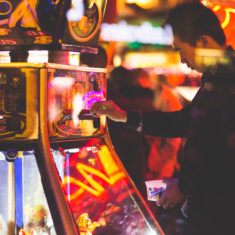The False Binary of Sports Betting
 In December, Deputy Solicitor General Jeffrey B. Wall argued to the Supreme Court that it isn’t states that are keeping the threat of underage betting at bay, but the Professional and Amateur Sports Protection Act (PASPA). If PASPA weren’t around, Wall seemed to suggest, New Jersey and other states would use their newfound freedom in order to get rid of all laws relating to betting, including the underage gambling laws they so strongly enforce.
In December, Deputy Solicitor General Jeffrey B. Wall argued to the Supreme Court that it isn’t states that are keeping the threat of underage betting at bay, but the Professional and Amateur Sports Protection Act (PASPA). If PASPA weren’t around, Wall seemed to suggest, New Jersey and other states would use their newfound freedom in order to get rid of all laws relating to betting, including the underage gambling laws they so strongly enforce.
If that were the case, then why would New Jersey heavily restrict underage gambling even when it comes to types of betting that are not covered under PASPA? According to our research study, New Jersey’s requirements for creating an online betting account are so strict that no minor has ever succeeded in opening one anywhere in New Jersey. Their reasoning is obvious: no sensible person in this debate believes kids should be gambling.
This kind of dramatic hyperbolic thinking has become typical of the PASPA debate. People in favor of keeping it around insist that they’re only trying to protect the children. However, the idea that legalized sports betting will suddenly wipe away protection for kids is a false binary.
Legal regulated sports betting is not a “Wild West” scenario
Wall’s argument to the justices posits the overturn of PASPA as a slippery slope. Give states an inch and they’ll take a mile, removing each and every casino regulation until even your kids are placing bets. This is not only unlikely, but not the goal of overturning PASPA to begin with.
If anything, the current sports betting landscape is far more of a Wild West. When everything’s illegal, nothing is restricted or enforced. Even former president Barack Obama placed a Super Bowl bet in 2016, joking that he’d pardon himself. We’re not saying it’s a bad thing that you participate in your office March Madness pool and cash changes hands—only that right now there is zero restriction on who bets on sports and how.
If PASPA is overturned, it would simply mean that instead of all of this sports betting occurring illegally and informally, states would be regulating it while earning money for their constituents.
Sports betting is for adults, not kids
Proponents of rationally regulated sports betting are not arguing that sports betting is something for kids to enjoy.
Some opponents counter that, that even if states continue to prevent minors from sports betting like they always have, the absence of PASPA will somehow make kids view sports in an unhealthy way. Somehow the very existence of legalized betting is portrayed as antithetical to sportsmanship. If that’s the case, then our current environment of adults betting on the Super Bowl and other professional league events is no better. PASPA hasn’t protected anything.
The idea that we can either have safe kids or legalized sports betting is a false binary. We can have both of these things as soon as we realize they simply aren’t related to one another at all.
